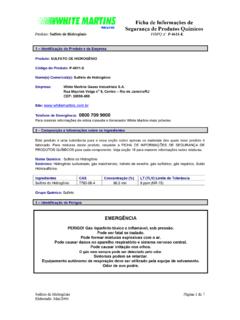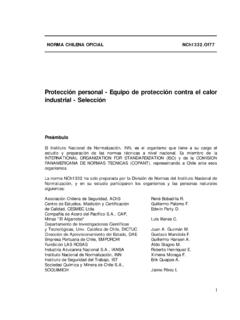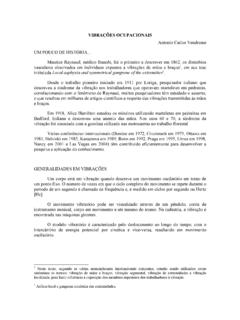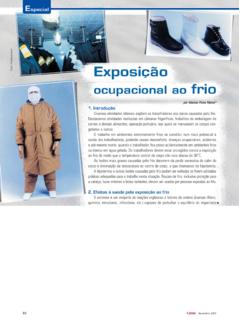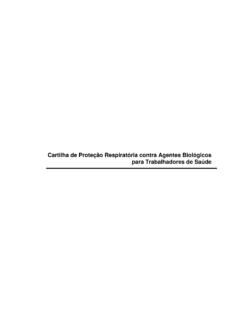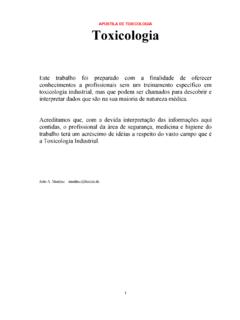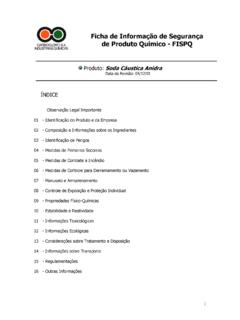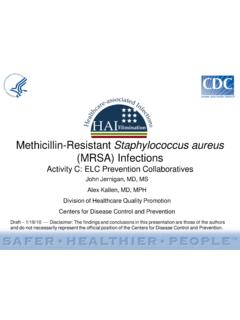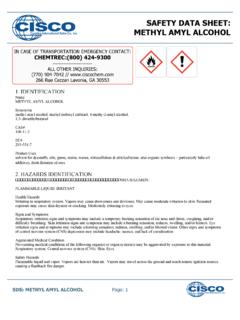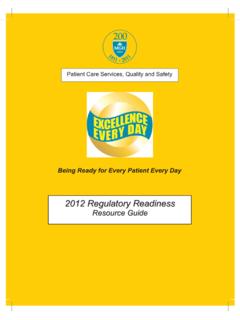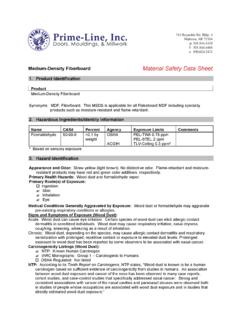Transcription of Professional Core Competencies for Infection Control
1 InfectionControlNursesInfection ControlNurses AssociationEducation SubCommitteeNovember ..2 Summary of Competencies ..4 Specialist KnowledgeMicrobiology ..6 Immunology ..6 Epidemiology ..7 Practice to prevent and Control Infection ..7 Decontamination ..8 Evidence-based Practice ..9 Teaching and Learning ..12 Management and Leadership ..13 Clinical Research ..14 References and Bibliography ..15 Appendix 1 ..16 Copyright Infection Control Nurses Association November 2000 ISBN: 0-9515620-6-1 Copies available from ICNA, c/o Fitwise, Drumcross Hall, Bathgate EH48 4 JTTelephone: 01506 811077 Fax: 01506 811477 e-mail: Control NURSES ASSOCIATIONPROFESSIONAL core Competencies FOR Infection Control NURSESN ovember 20001 IntroductionThe Competencies for Infection Control Nurses (ICNs) described in this document weredeveloped as a result of a consensus meeting organised by the Education Sub Committee ofthe Infection Control Nurses Association (ICNA) in July 1999.
2 Delegates were sought from themembership of the ICNA, with advice from relevant academic sources. Hence, thesecompetencies have been written by practising Infection Control Nurses. Following initialediting to remove duplication and standardise language, the document was circulated to allfull members of the Association prior to ratification by the National Executive Committeeand independent review by management Competencies aim to define the standards of practice expected of a competent ICN byidentifying key components of practice (termed domains); the specific competenciesrequired to work effectively within each domain; and key criteria that describe eachcompetency and against which performance or competence can be measured.
3 Theydescribe core , generic Competencies that are applicable to all practitioners in they provide a national standard for the United Kingdom and Ireland, it shouldbe noted that regional variances across the four countries have not been included. They donot define specific Competencies for related functions that form parts of the role for someICNs Public Health, Communicable Disease Control and Tissue Viability. It should beremembered that these Competencies are not static and will require regular review toaccount for the continuing changes within nursing and nurse Competencies for ICNs is an important development that is extremely relevant intoday s healthcare environment.
4 At the core of the clinical governance framework are theprinciples of ensuring the delivery of a quality service, continual Professional developmentand Professional self-regulation. Defining the Competencies expected of a proficient ICNprovides a framework within which performance can be evaluated, training needs identifiedand areas for Professional growth of competence is now a feature of post-registration nurse training courses andwill form part of the new career framework for nurses described in the NHS documentMaking a Difference (Department of Health 1999). The draft descriptor and standard forhigher level practice published by the United Kingdom Central Council for Nursing,Midwifery and Health Visiting (UKCC) in 1999 indicates that the attainment of this award willinvolve the assessment of level at which these Competencies have been set is intended to relate to an expertpractitioner who uses reasoning, critical thinking, reflection and analysis to inform theirassessment and decision making.
5 Additional Competencies are likely to be required for thosewishing to progress towards the UKCC Higher Level Practice award. Practitioners new to therole are unlikely to be able to demonstrate the full range of Competencies described here, asthese are only likely to be acquired through a combination of formal educationalprogrammes, informal learning opportunities and experience of using professionalknowledge. It is anticipated that these Competencies will be used in curriculumdevelopment and provide a framework for the progression of new practitioners. It Control NURSES ASSOCIATIONPROFESSIONAL core Competencies FOR Infection Control NURSES2 November 2000recognised that ICNs roles may vary and that not all the Competencies described may berequired for individual ICNs to perform their particular role.
6 For example, many of the criteriadescribed under the domain Management and Leadership will only be applicable to an ICNwho is employed to manage the Infection Control service. Similarly not all aspects of clinicalresearch will feature in the role of every Competencies should be used in conjunction with existing guidance on professionalpractice published by the UKCC, for example The Code of Professional Conduct (1992),Standards of Record Keeping (1993), Post Registration Education (1997) and Scope inPractice (1997).The next phase in the process will be the development of tools that individuals can use toassess performance and may ultimately facilitate self-regulation in line with recom-mendations ( The New NHS Making a Difference DoH 1999).
7 Competencies Working Group of the Education Sub Committee of the ICNAD ebbie King RGN BSc(Hons) DPSNJ ennie Wilson RGN BSc(Hons)Lauren Tew RGN DipN(Lond) BSc(Hons) PGDip(HE) RNTA cknowledgementsThe Competencies Working Group would like to thank the members of the competenciesconsensus group (Appendix 1) for their contributions to the development of this particular, we would like to thank George Castledine, Molly Courtenay, Elizabeth Jennerand Gareth Roberts for their advice and support, and Mrs Amanda James for her Control NURSES ASSOCIATIONPROFESSIONAL core Competencies FOR Infection Control NURSESN ovember 20003 Summary of CompetenciesDomain One:Specialist KnowledgeAREA OF COMPETENCECOMPETENCYM icrobiologyThe application of microbiological knowledgeto promote health, prevent and controlinfections and communicable application of immunological knowledge topromote health and Control Infection andcommunicable application of epidemiological knowledgeto Control infections and to prevent and The application of knowledge about Infection Control Infectioncontrol practice to prevent and Control infectionin clinical and non-clinical application of the principles of cleaning,disinfection and sterilisation to promote a Two.
8 Evidence-based PracticeAREA OF COMPETENCECOMPETENCYU sing Research in PracticeUse of evidence to critically evaluate anddevelop standards for Audit to Improve QualityUse of core audit of Control NURSES ASSOCIATIONPROFESSIONAL core Competencies FOR Infection Control NURSES4 November 2000 Domain Three:Teaching and LearningAREA OF COMPETENCECOMPETENCYF acilitating Learning in OthersUse of appropriate strategies and opportunitiesto share knowledge on Infection prevention of appraisal to facilitate learning and Professional The development of own Professional developmentknowledge and skills through lifelong learningDomain Four:Management and LeadershipAREA OF COMPETENCECOMPETENCYM anaging an Infection Use of a co-ordinated approach to ensure Control Serviceeffective management of the Five.
9 Clinical ResearchAREA OF COMPETENCECOMPETENCYI nterpreting ResearchCritical analysis of published ResearchParticipation in research independently Control NURSES ASSOCIATIONPROFESSIONAL core Competencies FOR Infection Control NURSESN ovember 20005 Domain OneSpecialist of CompetenceMicrobiologyCompetencyThe application of microbiological knowledgeto promote health, prevent and controlinfection and communicable diseaseKey and interprets microbiological data to assist in the prevention andcontrol of the clinical relevance of microbiological data to patients well beingand advises between modes of transmission of micro-organisms andrecommends appropriate methods of patients, service-users and situations to estimate the risk of transferand acquisition of and initiates appropriate actions to prevent and Control Infection microbiological data to evaluate the efficacy of the relevant legislation and guidance into practice ( COSHH)
10 Of CompetenceImmunologyCompetencyThe application of immunological knowledge topromote health and Control Infection andcommunicable diseaseKey the susceptibility of individual patients and clients to Infection and initiates appropriate strategies to minimise the risk of Control NURSES ASSOCIATIONPROFESSIONAL core Competencies FOR Infection Control NURSES6 November 2000 Domain OneSpecialist of CompetenceEpidemiologyCompetencyThe application of epidemiological knowledgeto prevent and Control infections andcommunicable diseaseKey , assembles and interprets epidemiological data to assist in theinvestigation, prevention and Control of relevant information technology to collect and interpret data epidemiological data and knowledge to formulate action plansrelevant to local strategic plans to prevent and Control and manages outbreaks, seeking advice from those withexpertise where on, and evaluates.
